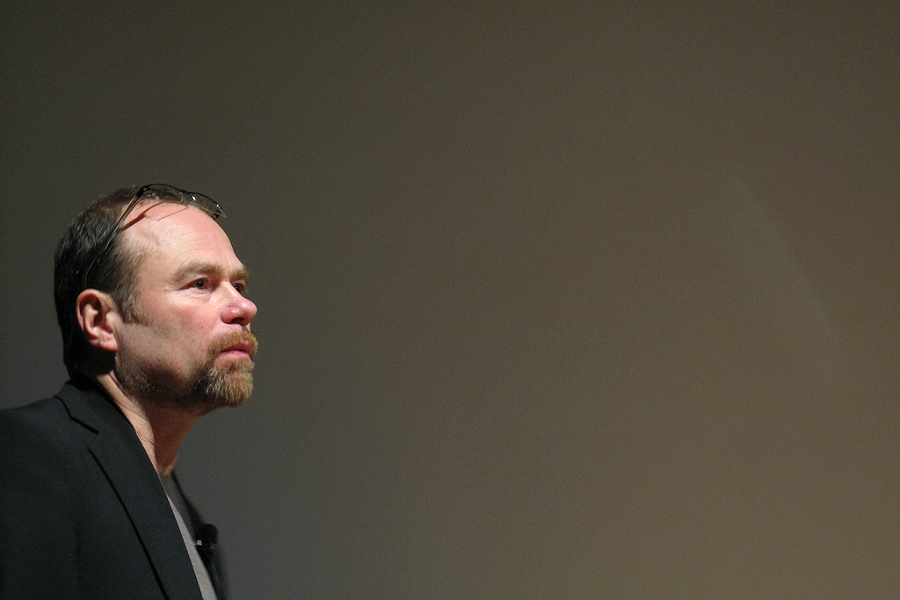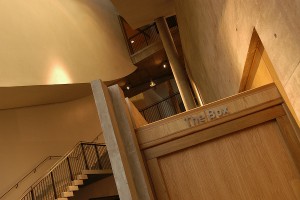The Big Interview: Mike Stubbs

FACT is 10 later this month. We spoke to its Director and CEO Mike Stubbs about its impact and its future…
It’s a year of anniversaries for some our biggest arts institutions, each of them significant in their own way. One of the most interesting of those birthdays is that of FACT, this year celebrating a decade, in their own words, of “innovation in film, art and creative technology”. It’s difficult to argue with the sentiment – walk up Wood Street 10 years ago and the site where FACT now sits was a very different one.
With this in mind, we thought now was an entirely appropriate time to interview FACT Director and CEO, Mike Stubbs. Stubbs, who has been at FACT for six of those 10 years, arrived having previously been at the Australian Centre for Moving Image (ACMI), but he’s explicit that his journey started much earlier: “Before that I was a child, that’s a good starting point to talk about curiosity … I was never particularly good at maths, writing; therefore [I got] involved in visual culture, the performative and moving image as an artist.”
Art led him to study at the RCA and, coincidentally, as a practicing artist his last show in Britain was at the Baltic in 2004, “which had a piece of work about Newcastle losing the bid for capital of culture.” Shortly after, FACT came calling. “I was in Australia and hadn’t planned to move back to Britain but was invited to interview after they hadn’t appointed from their first round search.”
He confesses that had FACT “been in Tokyo or New York” he’d have moved there, but Stubbs, whose grandfather had been a docker in Bootle, insists he’s now “in love with the place.” After a digression into the jobs he’s had – “I’ve done all kinds of work … Ultimately if you take pleasure in your work, life, recreation, it all becomes one thing” – we move into the realm of his role at FACT and the role of the space in general. “My approach – even though we are associated with new media industries – is to ask provocative questions. I think that’s what the role of arts and culture is; certainly artists. They ask questions that other people don’t have license to.”
So when you’re in the (mostly enviable) position of director of a forward thinking and progressive gallery such as FACT, how best to carry that out? “In Melbourne [at ACMI] we did a load of outdoor events. How could I move FACT’s programme outside the discreet barriers of the four walls of the gallery – all intimidating to Joe Public in my view.” He explains he was brought up in a family that “didn’t go to art galleries, do theatre … I believe in popular culture. If we’re good, we … create the space and opportunity for artists – then we have to find ways of mediating some of those messages.

“I’m really interested in work which is trying to bridge virtual and material worlds, work which speaks to everyday audiences, but also may live in the gallery … Where those two mix is my strongest interest.” That in mind, we ask what FACT’s impact has been in its 10 years, but first he’s quick to acknowledge one of the gallery’s peers. “If Tate hadn’t set up in Liverpoool, FACT wouldn’t have happened. We see the success of cultural regeneration through a project like FACT.” Citing Kurt Hentschläger’s ZEE (which FACT hosted at 2011’s AND Festival), he contends “it’s really pushing the boundaries of what art could be, crossing multiple disciplines”. Indeed, ZEE was a piece that felt right at home in FACT, at once beguiling, progressive and personal, while unmistakably ‘Art’.
He also refers to Apichatpong Weerasethakul, the Thai filmmaker and artist whose work FACT part-funded: “We made an investment and he then won the Palme d’Or at Cannes. For me that was great. Risk comes into it, his work is risky within the political context of Thailand; it asks questions of relationships with communities in Bangkok.” Indeed, there have been many fine shows since FACT opened its doors (which we’ll come to), but it is of course also a cinema. We’re interested in how Stubbs sees FACT’s role in this context, and what commitment, given the recent buyout of Picturehouse by Cineworld, to ‘art-house’ we should expect in the coming months and years.
Stubbs is really interested in how, if you can entice people into FACT on the pretext of seeing a Hollywood movie, the chances that they’ll have a brush with more interesting cinema or art in the gallery spaces are relatively high. “Clearly it’s preferable to expand people’s sense of curiosity in being exposed to other films/arts … It’s a serendipitous network of information, and I’m privileged to have the chance to be part of it all. If people start to see some links to those things, job done. If people come to see Lawless, that’s fine too.”
And that’s great if people go to FACT to see a movie like Lawless and leave with a new appreciation of the artwork, but we wonder about the person that comes to see a piece of art-house cinema and leaves disappointed, having seen Lawless. “What tends to happen is that I’m always bumping into people who say ‘it would be great if you could do a Bergman season’ [but] it’s unlikely because not enough people would come. However, we might do a Bergman special in the Box (above)… We will continue to work across niche markets and cultural cinema as long as people express interest – I’d love to do a French New Wave series but I don’t know if the interest’s there.”
At this point we’ve taken up getting on for an hour of Stubbs’s time, so we cut to the chase and ask him about his favourite programming in his time here: “in terms of my job as director of FACT, Pipilotti Rist is possibly the most successful, and I remember lying on the carpet missing a meeting or two … I was having so much pleasure. For me personally, the Bernie Lubell exhibition was so great, wooden machines that could only really be viewed by activating them. [It] makes you realise a lot of your actions are pointless – that’s philosophical.”
And what should we expect of FACT in the next 10 years? Simple: “To continue to evolve new methods of creating, producing, showing art. Experimenting with that and taking risk.”
FACT celebrates its first decade on 23rd February





